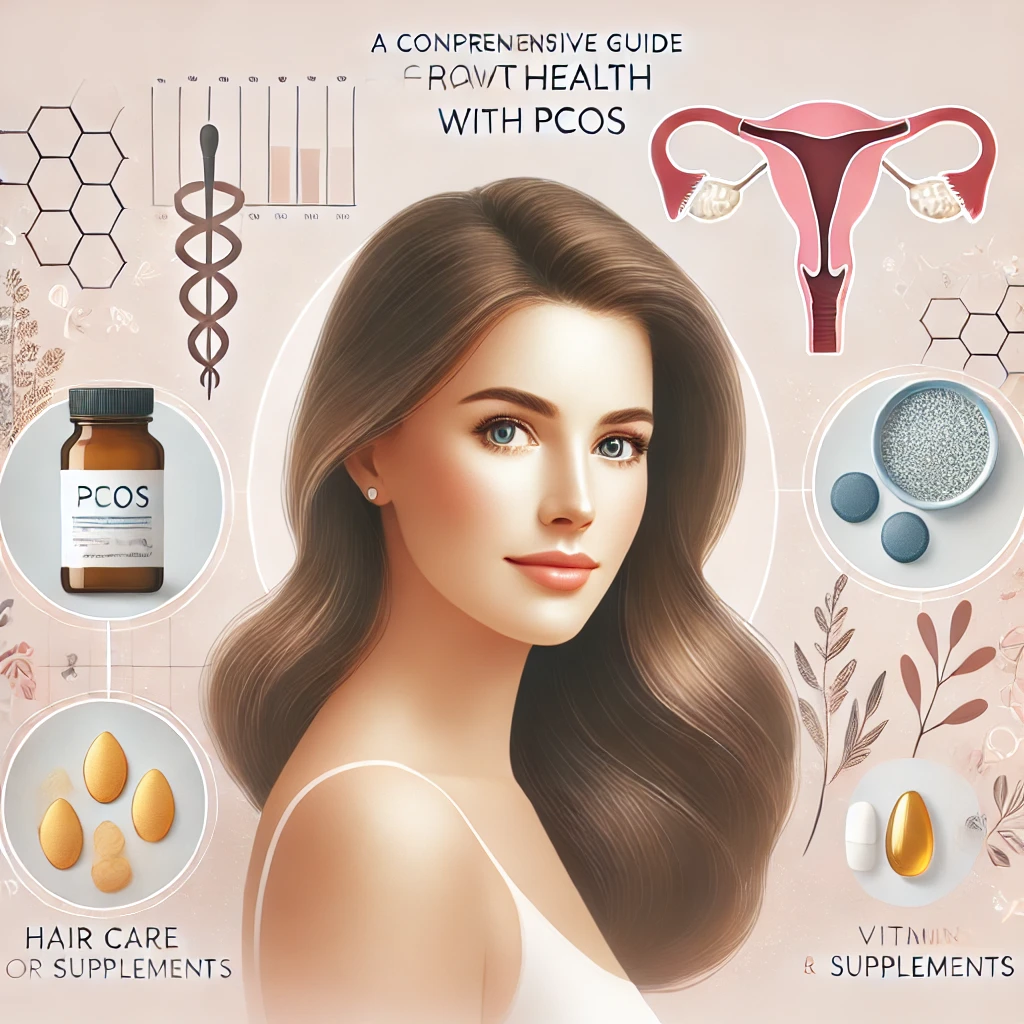
Polycystic Ovary Syndrome (PCOS) affects millions of women, with one of its most challenging and emotionally taxing symptoms being hair health issues. Whether you’re experiencing hair thinning on your scalp or battling unwanted hair growth in other areas, managing these changes can feel overwhelming. This guide is here to help you understand the interplay between PCOS and hair growth, explore actionable treatments, and share success stories that inspire hope.
Understanding the Connection Between PCOS and Hair Growth
PCOS is a hormonal disorder that can disrupt your body’s delicate balance in several ways, leading to the following hair-related challenges:
- Androgenic Imbalances: PCOS can increase androgen (male hormone) levels, triggering scalp hair loss (androgenic alopecia) and leading to growth in unwanted areas like the face and body.
- Insulin Resistance: Many women with PCOS experience insulin resistance, which can cause inflammation—a key factor contributing to hair thinning and hair loss.
- The Emotional Impact: Hair loss and growth in undesirable areas can diminish self-esteem, increasing stress and anxiety that further exacerbate symptoms.
Despite these challenges, the right approach can help you manage these symptoms effectively and support improved hair health.
The Benefits of a Proactive Treatment Plan
While addressing hair health with PCOS may seem daunting, empowering steps and treatments can provide physical and psychological benefits. A tailored routine can stimulate regrowth, help manage unwanted hair, and improve your confidence and quality of life.
Below, you’ll find a detailed plan designed to tackle PCOS-related hair growth issues head-on.
Treatment Options and Remedies for Hair Growth with PCOS
1. Consult Your Healthcare Provider for a Personalized Plan
Work with your doctor to explore medications such as:
- Hormone Regulators: Medications like oral contraceptives or spironolactone may help balance androgen levels, reducing scalp hair loss and unwanted growth.
- Insulin Resistance Management: Drugs like metformin improve insulin sensitivity, indirectly supporting hair regrowth by reducing inflammation.
2. Boost Hair Growth with Supplements
Certain nutrients have been shown to promote healthier hair growth:
- Biotin and Folic Acid: Known for fortifying hair strands and encouraging regrowth.
- Omega-3 Fatty Acids: Reduces inflammation and supports scalp health.
Always consult a healthcare professional before incorporating new supplements into your routine.
3. Try Topical Solutions for Direct Scalp Treatment
Minoxidil is a highly recommended topical treatment proven to stimulate hair follicles and promote regrowth. Apply solutions like 2% or 5% minoxidil consistently for best results.
4. Harness the Power of Technology with Laser Therapy
Laser treatments for the scalp stimulate blood flow and improve hair density. Devices like laser combs or caps can be used at home under a professional’s guidance.
5. Adopt Lifestyle Changes That Support PCOS Management
- Balanced Diet:
- Incorporate anti-inflammatory foods, like leafy greens, fatty fish, and nuts.
- Limit processed foods that can spike insulin levels.
- Regular Exercise:
- Activities like yoga, pilates, and strength training help combat insulin resistance and regulate hormones.
- Stress Reduction:
- Chronic stress worsens PCOS symptoms. Consider mindfulness techniques, therapy, or hobbies to manage stress effectively.
6. Manage Unwanted Hair Growth
Sometimes, reducing or removing unwanted hair growth can contribute significantly to emotional relief:
- Cosmetic Methods:
- Shaving, waxing, or threading offer temporary solutions.
- Long-Term Options:
- Consider professional laser hair removal or prescription creams that slow hair growth.
Real Success Stories
Sometimes success stories encourage hope and persistence. Here are a few examples of women who transformed their hair health through patience and perseverance.
Sarah (Age 28)
Challenge: Severe scalp thinning caused by hormonal imbalances.
Solution:
- Prescribed metformin and spironolactone.
- Utilized biotin, omega-3 supplements, and a topical solution.
- Adopted a regular yoga routine and anti-inflammatory diet.
Result: After six months, Sarah noticed significant hair density improvements and regained her confidence.
Emma (Age 32)
Challenge: Androgenic alopecia and irregular androgen levels.
Solution:
- Birth control to regulate hormones and daily minoxidil application.
- Dietary additions of anti-inflammatory foods and stress management.
Result: Within a year, Emma experienced regrowth and increased hair thickness. She also reduced her stress levels, which helped maintain her positive results.
Alex (Age 26)
Challenge: Unwanted facial and body hair growth.
Solution:
- Oral contraceptives to control androgens.
- Laser hair removal sessions combined with scalp minoxidil and healthier eating habits.
Result: Alex saw reduced unwanted hair growth and better scalp health while gaining body confidence.
Final Thoughts
Managing hair-related symptoms of PCOS requires a tailored, multi-faceted approach. By combining medical treatments, targeted remedies, and lifestyle changes, you can make significant progress not only in your hair health but also in how you feel about yourself.
Quick Recap – Actionable Steps to Get Started
- Understand PCOS’s impact on hair health.
- Consult a healthcare provider for personalized treatment.
- Use supplements and topical treatments to enhance growth.
- Explore scalp therapy options like laser treatments.
- Adopt a balanced diet, exercise routine, and stress management practices.
- Utilize cosmetic options for addressing unwanted hair growth.
- Lean on expert advice and community networks for emotional and practical support.
Take charge of your PCOS symptoms starting today. Remember—it’s okay to seek help on this path. Consult your doctor, connect with support groups, and celebrate small victories along the way.
If you’ve found this guide helpful, we’d love to hear about your progress! Share your success story or join the discussion with others navigating similar challenges. Together, you can achieve lasting hair health and renewed confidence.







